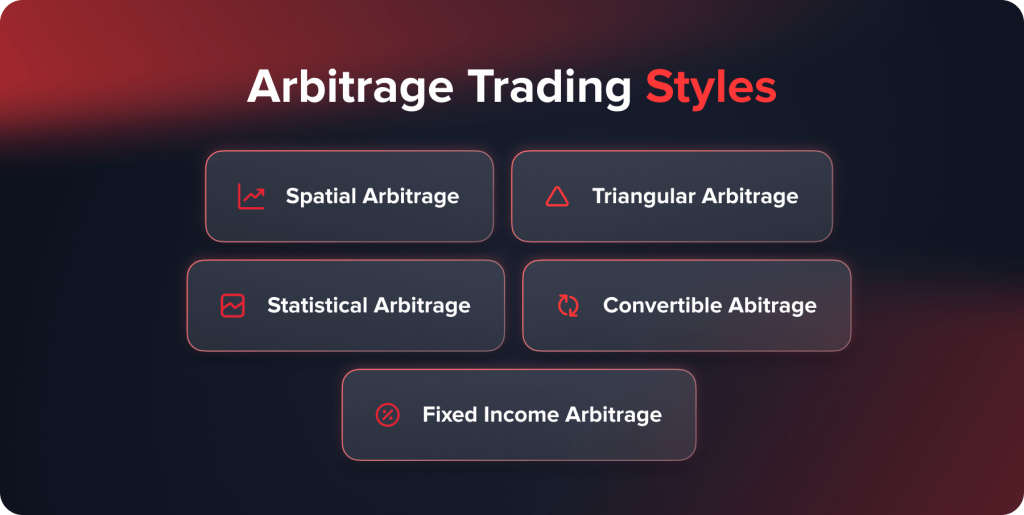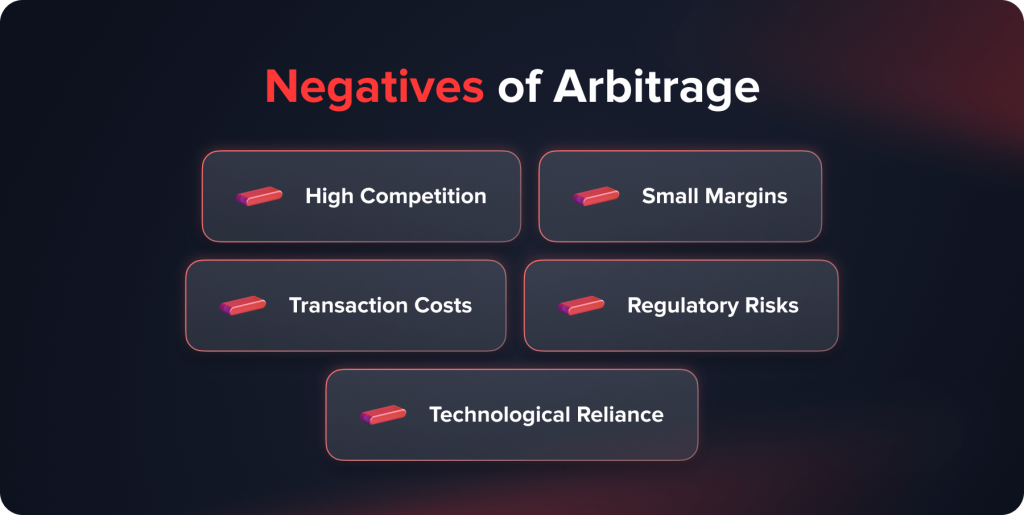
Arbitragem de Negociação: O que é e como funciona
Conteúdo
A negociação de arbitragem — utilizando variações de preços entre diversos mercados ou classes de ativos — é uma tática bem conhecida no setor financeiro. O conceito fundamental dessa abordagem é usar variações de preço comprando na baixa em um mercado e vendendo na alta em outro. Este artigo aprofundado ensinará as nuances da negociação de arbitragem, suas vantagens e desvantagens, o estado das regulamentações e a perspectiva da corretora.
Como funciona a arbitragem?
A arbitragem visa se beneficiar das flutuações de preços dos ativos. A arbitragem permite que um trader lucre comprando e vendendo um ativo simultaneamente em vários mercados com preços variáveis. Embora essa estratégia pareça simples, ela requer profundo conhecimento de mercado, experiência e as ferramentas necessárias para aproveitar as possibilidades.
A negociação de arbitragem lucra principalmente com as diferenças de mercado que podem surgir de variáveis como mudanças na liquidez do mercado, descompassos entre oferta e demanda ou lacunas na atualização de preços entre plataformas. O sucesso da negociação de arbitragem depende da velocidade, precisão e capacidade de transação rápida; essas diferenças geralmente têm pouca influência umas sobre as outras.
You may also like

Vários estilos de negociação de arbitragem
Embora possa ser utilizada em métodos que abrangem mercados e tipos de ativos, a arbitragem não é uma abordagem única para todos. Seguem algumas variações típicas.

- Arbitragem Espacial é o acordo em que o mesmo item é comprado e vendido em vários locais geográficos. O exemplo de uma ação listada em duas bolsas de valores mencionado anteriormente se enquadra nessa categoria. A arbitragem geográfica também pode envolver qualquer ativo negociado entre mercados, moedas ou commodities.
- A Arbitragem Triangular utiliza variações nas taxas de câmbio de três moedas. Se as taxas mudarem entre USD, EUR e GBP, para obter lucro, o arbitrador converteria USD para EUR, EUR para GBP e, em seguida, GBP de volta para USD.
- A arbitragem estatística utiliza análise estatística para identificar oportunidades de negociação. Normalmente, envolve a negociação de pares de ações ou ativos que apresentam correlação. Quando os preços divergem, o operador aposta que se reunirá comprando o ativo subvalorizado e vendendo o supervalorizado.
- A arbitragem conversível consiste na compra de títulos ou ações preferenciais e na venda a descoberto da ação subjacente. Particularmente em casos de condições de mercado que tornam a conversão lucrativa, o objetivo é lucrar com as variações de preço entre o título e o seu patrimônio subjacente.
- A arbitragem de renda fixa é uma abordagem implementada nos mercados de títulos, onde especuladores capitalizam as disparidades de preços entre investimentos em renda fixa. Por exemplo, eles podem investir em títulos do governo e seus derivativos ou negociar títulos de vencimentos variados do mesmo emissor para capitalizar as flutuações de rendimento.
Riscos e Considerações
A negociação de arbitragem não é isenta de riscos, apesar do potencial de lucro. A execução é o principal fator de risco, pois os negociadores podem enfrentar dificuldades na condução das transações, o que pode levar a perdas. Outro fator a ser considerado é o risco de mercado, pois os valores dos ativos podem variar negativamente entre a aquisição e a venda, reduzindo, portanto, os lucros. Além disso, custos de transação, como impostos e taxas de corretagem, afetam a lucratividade das atividades de arbitragem.
Liquidez é outro aspecto a ter em mente. Em mercados ilíquidos, comprar ou vender ativos nas quantidades necessárias sem afetar os preços pode ser difícil, possivelmente anulando oportunidades de arbitragem. Além disso, com o aumento da eficiência dos mercados, a frequência e a lucratividade das oportunidades de arbitragem podem diminuir ao longo do tempo, o que representa um desafio para quem utiliza essa estratégia.
A arbitragem é ilegal?
Em sua forma básica e fundamental, a arbitragem é considerada legal e reconhecida como um método de negociação legítimo na maioria das jurisdições.
A arbitragem tem um propósito nos mercados: minimizar as disparidades de preços e aumentar a eficiência do mercado. Essa prática não é apenas legal, mas também benéfica, pois visa alinhar os preços ao seu valor real, promovendo a justiça entre diferentes plataformas de negociação.
Muitos países permitem a negociação de arbitragem, dentro dos limites da regulamentação, é claro, pois isso ajuda a corrigir discrepâncias de preços e aumenta a liquidez do mercado. Em mercados estabelecidos, como os EUA, o Reino Unido e a UE, a negociação de arbitragem é considerada uma prática legal em operações de mercado. Os negociadores que se envolvem em atividades de arbitragem são geralmente considerados como operando dentro dos limites, desde que cumpram os requisitos regulatórios.
A legalidade da arbitragem pode variar dependendo do tipo de estratégia de arbitragem empregada e de como ela é executada. Formas simples de arbitragem, como a arbitragem triangular, são amplamente aceitas globalmente e consideradas lícitas.
No entanto, há casos em que a arbitragem pode ultrapassar fronteiras. Por exemplo, o insider trading e a arbitragem baseada em informações envolvem o uso de informações não públicas para conduzir negociações em benefício próprio. Tais práticas são ilegais na maior parte do mundo, com órgãos reguladores implementando leis rigorosas para combater o insider trading. Além disso, existem métodos de arbitragem, como manipulação de mercado e front running.
É possível viver de arbitragem?
Certamente, envolver-se em arbitragem pode ser uma forma de ganhar a vida. No entanto, exige expertise, experiência e um investimento de capital substancial. A negociação de arbitragem envolve identificar e alavancar diferenciais de preços entre mercados ou ativos. Embora a ideia possa parecer simples, à primeira vista, obter lucro consistente por meio da arbitragem exige mais do que um conhecimento básico da dinâmica do mercado. Para ter sucesso na negociação de arbitragem, os indivíduos precisam de compreensão e expertise nos mercados em que operam. Isso implica ter amplo conhecimento das tendências de mercado, níveis de liquidez e do momento ideal para as transações. Indivíduos que se destacam em arbitragem frequentemente passaram anos aprimorando suas habilidades e desenvolvendo a capacidade de identificar oportunidades que outros podem ignorar.
Quais são as desvantagens da arbitragem?
Apesar do seu potencial de ganhos, a arbitragem apresenta desafios significativos que podem complicar sua estratégia. Esses desafios decorrem da natureza do mercado, da necessidade de tecnologia de ponta e da presença de riscos imprevistos.

Alta Competição
Uma das desvantagens de se envolver em operações de arbitragem é enfrentar a concorrência. O conceito de arbitragem é amplamente reconhecido nos mercados financeiros, atraindo traders que vão desde grandes instituições a fundos de hedge e empresas de negociação proprietárias — todos competindo por oportunidades idênticas.
Grandes corporações nesse setor dispõem de enormes recursos, como tecnologia de ponta, acesso a informações de mercado e reservas financeiras substanciais. Essas vantagens lhes conferem uma vantagem sobre os traders que operam de forma independente.
A intensa concorrência neste setor resulta na rápida detecção e correção de diferenças de preço, deixando pouco tempo para os traders capitalizarem as oportunidades de arbitragem. Essa janela de oportunidade apertada exige que os traders ajam de forma rápida e eficaz, tornando difícil para aqueles sem as ferramentas ou experiência necessárias para prosperar neste ambiente.
Pequenas Margens
Outra desvantagem notável da arbitragem são as margens de lucro normalmente envolvidas. Essa estratégia se baseia na exploração de variações de preços entre mercados, de apenas frações de um ponto percentual. Embora esses pequenos lucros possam se acumular ao longo do tempo, eles exigem um volume de negociações para gerar retornos.
Por exemplo, uma oportunidade de arbitragem pode apresentar uma margem de lucro de 0,1%. Para gerar renda com oportunidades, um trader precisaria executar negociações totalizando centenas de milhares ou até milhões de dólares. Essa dependência do volume de negociações não aumenta o risco, mas também impõe demandas consideráveis ao capital e aos recursos de negociação do trader.
Além disso, mesmo um pequeno erro na execução de uma negociação ou uma mudança inesperada nas condições de mercado pode transformar um lucro em prejuízo, ressaltando as dificuldades associadas às margens de lucro na negociação de arbitragem.
Custos de transação
Taxas e encargos associados às transações, como taxas de transação, comissões e impostos, representam outra desvantagem da arbitragem. Dadas as pequenas margens de lucro envolvidas, essas despesas têm o potencial de reduzir substancialmente a lucratividade das transações de arbitragem. Cada negociação realizada dentro de uma abordagem de arbitragem incorre em despesas e, se não forem gerenciados com prudência, esses custos podem se acumular rapidamente, potencialmente transformando uma estratégia em uma estratégia ineficiente.
Por exemplo, se um trader identifica uma oportunidade de arbitragem com uma margem de lucro de 0,2%, mas os custos de transação são de 0,15%, o lucro final cai para 0,05%. Em alguns casos, os custos de transação podem superar completamente os lucros, tornando a operação impraticável.
Para enfrentar esse desafio com sucesso, os arbitradores devem avaliar meticulosamente todas as despesas antes de executar as negociações e procurar corretoras ou plataformas de negociação que ofereçam as taxas mais baixas. No entanto, essa tarefa pode ser intimidante para pequenos traders, que não têm o poder de barganha de instituições maiores.
Riscos regulatórios
Os riscos regulatórios representam outro desafio significativo para a negociação de arbitragem.
Os mercados financeiros são influenciados por regras em constante evolução, que podem diferir significativamente entre as regiões. Alterações em regulamentações, interpretações ou métodos de execução podem impactar diretamente a viabilidade de estratégias de arbitragem. Por exemplo, novas regras podem impor limites às transações, introduzir taxas sobre negociações ou exigir divulgações adicionais, o que pode diminuir a lucratividade das possibilidades de arbitragem. Às vezes, as autoridades podem até proibir tipos de atividades de arbitragem que envolvam ferramentas financeiras ou práticas de mercado percebidas como manipulativas. Para navegar por esses desafios, aqueles que se envolvem em arbitragem devem se manter atualizados sobre o cenário em seus mercados de negociação. Eles devem estar prontos para ajustar suas abordagens à luz das modificações legais. Isso exige não apenas a compreensão das regulamentações existentes, mas também a capacidade de prever e reagir a potenciais mudanças futuras.
Dependência tecnológica
O sucesso na negociação de arbitragem depende fortemente de tecnologia de ponta no cenário acelerado de negociação automatizada atual. Sistemas de negociação de alta frequência (HFT), algoritmos sofisticados e plataformas de negociação de última geração são frequentemente essenciais para identificar e executar oportunidades de arbitragem com precisão. No entanto, essa dependência da tecnologia traz consigo suas desvantagens.
Os custos iniciais envolvidos na obtenção, manutenção e aprimoramento da tecnologia podem ser bastante elevados para traders individuais ou pequenas empresas. Além disso, a natureza complexa desses sistemas exige um nível de expertise para sua operação. Isso significa que os arbitradores devem possuir essas habilidades ou contratar pessoal especializado.
Além disso, os sistemas tecnológicos não são infalíveis. São vulneráveis a falhas, atrasos e outros problemas técnicos que podem levar à perda de oportunidades ou a contratempos financeiros. Em um cenário onde velocidade e precisão são cruciais, qualquer falha técnica pode ter implicações na lucratividade de um arbitrador.
Corretores e Arbitragem de Negociação
Embora as corretoras geralmente reconheçam a arbitragem como uma estratégia, ela traz consigo um conjunto de condições e restrições. Embora corretoras e casas de apostas vejam a arbitragem como uma tática, elas frequentemente estabelecem regulamentações e mecanismos de monitoramento para proteger seus interesses. Entender essas sutilezas é essencial para que os envolvidos em arbitragem evitem disputas, limitações ou até mesmo o encerramento de contas.
A maioria das corretoras permite a arbitragem porque é uma estratégia que contribui para a eficiência do mercado. Ao permitir que os traders capitalizem com as diferenças de preço, as corretoras facilitam um ajuste nos mercados que harmoniza os preços em todas as plataformas e garante um ambiente de negociação mais estável.
No entanto, a dinâmica entre corretoras e operadores de arbitragem pode ser complexa. As corretoras normalmente aplicam regulamentos e termos que determinam os tipos de táticas de arbitragem que podem ser utilizadas. Esses regulamentos existem principalmente para impedir atividades que possam impactar negativamente o modelo de negócios das corretoras ou criar um cenário de negociação.
Conclusão
A negociação por arbitragem é uma abordagem que exige análise aprofundada, tomada de decisão rápida e consciência dos riscos associados. Embora apresente oportunidades de lucro por meio da capitalização das ineficiências do mercado, também apresenta obstáculos como supervisão e requisitos tecnológicos. Para indivíduos interessados em se aprofundar nessa técnica de negociação, a compreensão dos mercados e a dedicação ao aprendizado e à adaptação contínuos são cruciais.
Atualizado:
19 de dezembro de 2024



